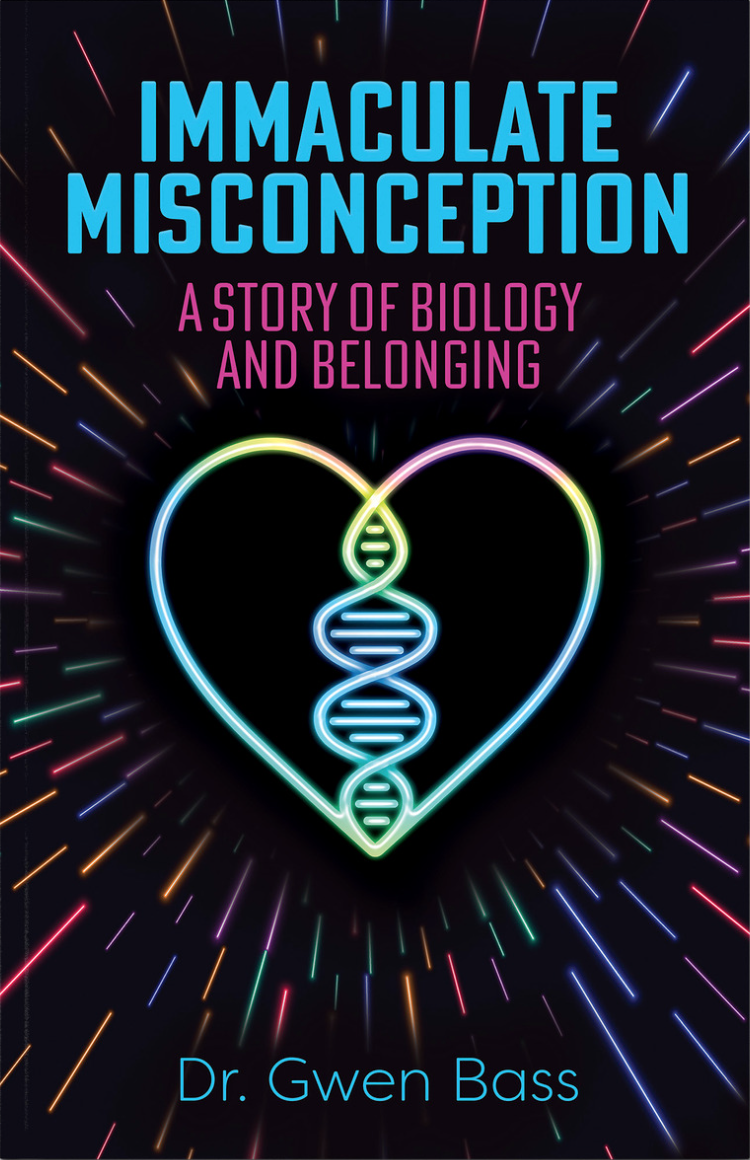Immaculate Misconception: A Story of Biology and Belonging
“Gwen Bass is a truth-seeker and a truth-teller. This is the story of a courageous woman who realizes that she doesn’t need to live up to anyone’s expectations - including her own - and that family can be whatever we want it to be.” - Lesléa Newman, Author of Heather Has Two Mommies
My parents were sworn to secrecy. There would be no record of the procedure (paid for in cash) and no information about the donor’s identity.
The result of this clandestine insemination was me: a baby born of what was essentially a science experiment. At that time, in 1982, my birth was an inherent challenge to society’s definition of family. My parents and I had no role models to look to as the road towards building a queer family had yet to be paved.
I grew up surrounded by both chosen and biological relatives. My upbringing was imbued with the conviction that family extends beyond our DNA. By the time I entered preschool, I was an unwitting spokesperson for the gay movement I was born into. My family was “different” to the world, but it was all I knew.
I believed that biological relation didn’t matter all that much; love and commitment informed my sense of belonging more than DNA ever could.
But when, at 36, I spat into a tube, found my 10 siblings, and then our shared donor, a whole new understanding of my identity began to unfold.
Purchase Your Copy Today!
I love Gwen and I love her story! This book is an informative, candid, and honest deep dive into the queer family experience. It's not often we get to hear the perspectives of being both a donor-conceived kid from a same-sex family AND raising your own same-sex family as an adult. It's a full-circle story that absolutely needed to be told. -Jaimie Kelton, The Queer Family Podcast
How Immaculate Misconception Was Born
While I didn’t set out to write a memoir, signs that it was time to share my life story were everywhere.
I began to see how my conception, upbringing, and family-finding directly influenced who I am today — from how I have built my own family to the professional life I have dedicated myself to: working with kids whose families and identities exist outside of tidy, normative storylines.
Growing up, I straddled two worlds: at home, I lived with my non-traditional family but in the wider world I lived in everyone else’s heteronormative reality. By bridging the gap I was living proof that kids with lesbian parents could turn out okay.
The disconnect between my personal life and the outside world reaffirmed what I believed: that I was alone in my experience, code-switching in ways my peers couldn't quite understand.
When I discovered my biological family, a flurry of new questions about identity and belonging emerged:
What happens when we’re born into an identity we didn't choose?
What does biology have to do with belonging?
How do we all, in our own ways, suppress unique aspects of our identities in an effort to fit in and secure our safety?
How do we unintentionally harm others by assuming they fit into our view of “normal”?
In Immaculate Misconception, I ask these questions by looking back at my life story and the part of queer history I was born into. Each chapter begins with a common query I fielded as a kid:
“What’s your dad like?”
“Do you look more like your mom or your dad?”
“Do you have siblings?”
“Where were you born?”
And my favorite: “Are you going to be gay because your parents are?” (Turns out: yes and no.)
Today, there is a growing community of queer people building families and making decisions about donor registries, sibling contact, and the role of biological family. In sharing my story, I hope to offer insight into some of the issues these non-hetero families may be grappling with.
That said, many of us — queer or not — are in a lifelong process of negotiating how nature and nurture have influenced us. Immaculate Misconception is for all of us grappling with all that informs our sense of self.
Why I Wrote This Book
Over the past 13 years, I have built my own family, woven together by a combination of genetic bonds and connections forged by deep love. Like me, my kids have two maternal figures, siblings raised by different parents, and fathers they don’t live with.
We’re living in a time of queer inclusion and liberation (and the fierce backlash of oppression that comes with any liberation movement). More families in pop culture and in day-to-day life look like mine, yet their honest family stories remain mostly untold.
Marriage equality for same-sex couples offered protection and validation, but it also solidified a cultural concept that gay people are just like straight people. The truth is, we aren’t. As many queer families try to abide by heteronormative family ideals, they often surrender that which makes them unique.
Immaculate Misconception offers kids in non-traditional families a way to connect with their own identities and stories.
While so much has changed since I was a kid, the impact of “being different” still makes a mark on anyone in a non-traditional family. Kids of queer parents still code-switch between home and school — all in an effort to survive in mainstream society.
How can we celebrate what makes queer families different while normalizing that families can be built in a range of ways?
My sincere hope is that Immaculate Misconception inspires us all to approach others with more curiosity and less assumption, taking time to notice the aspects of others’ identities that might otherwise go unseen.
Order your copy of Immaculate Misconception on Amazon or your local independent bookstore.



